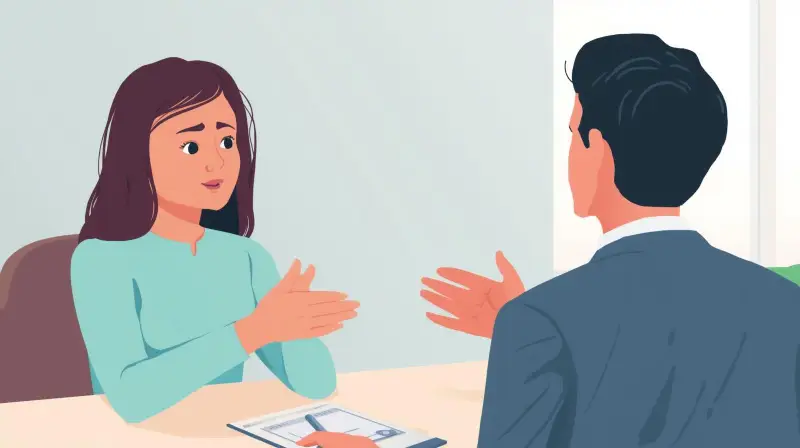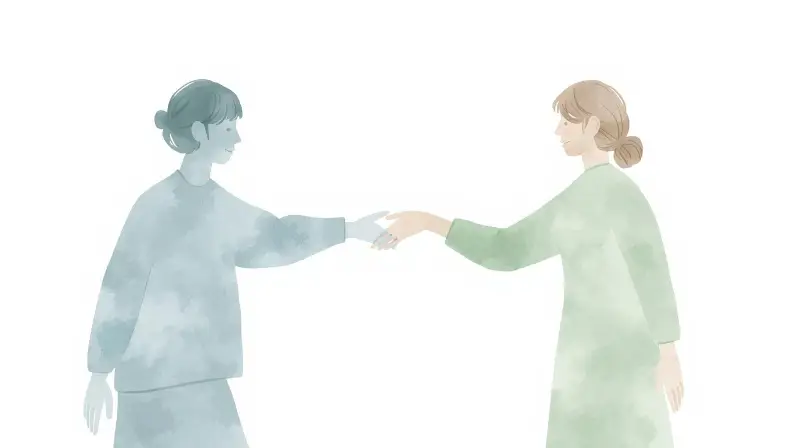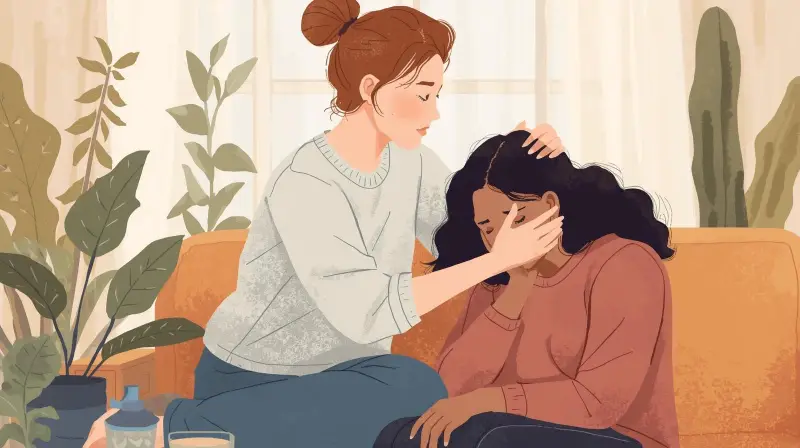If you’re the go-to person. The one who always picks up the late-night calls, deciphers vague texts, listens without judgment, and somehow always knows what to say when someone else is falling apart. You’ve become the unofficial emotional support system of your friend group, or in much simpler terms, the “therapist friend”.
And, of course, it’s nice to be trusted. There’s something deeply fulfilling about helping people, about knowing you’ve made someone feel seen and safe. But at the end of the day, you’re your own individual with emotions, and being the therapist friend can also leave you completely drained. The emotional exhaustion builds up quietly, and before you know it, you’re burnt out and resentful, wondering why no one asks how you are doing.
In this article, we will unpack what it truly means to be a therapist friend, why it can be both a blessing and a burden, and how to support others without sacrificing yourself in the process.
Understanding the ‘Therapist Friend’ Identity

You don’t need to be professionally trained to be a “therapist friend”. The tag means you’ve naturally stepped into the position of listener, comfort-giver, and emotional first responder. People open up to you quickly. They feel safer around you. They call you at midnight in tears or message you with paragraphs about situations they don’t know how to handle. And you respond because that’s just who you are. Empathy runs in your veins, and you’re good at staying grounded when others fall apart.
You’re not just offering advice. You’re offering your time, energy, and emotional bandwidth. And while this dynamic might be rooted in love and trust, it’s not always reciprocal. Over time, the emotional scale in your relationships can become unbalanced without either side fully realizing it.
Why and How Did You End Up Being The Therapist Friend?

There’s usually a mix of traits that make someone the designated go-to friend. You’re probably empathetic, emotionally intelligent, a solid communicator, and genuinely kind. You give people the sense that they’re not alone, and in a world where vulnerability is rare, that’s incredibly valuable. But this also puts you in a position where people become dependent on your support, often without recognizing how heavy that can become for you.
The Hidden Weight and How Emotional Labor Adds Up

Burnout doesn’t always manifest in total collapse. Sometimes it creeps in slowly, disguised as fatigue that doesn’t go away or irritability toward the very people you care about. You might start feeling emotionally unavailable without really knowing why. Conversations that once energized you now leave you feeling drained. You stop sharing your own struggles, not because you’re fine, but because it feels easier to just keep listening than to flip the script.
Emotional labor, or the effort it takes to listen, process, validate, and support others, can quietly accumulate. And unlike physical labor, its weight isn’t always visible. The more you carry, the heavier it becomes, especially when you’re not given the same space to process your own thoughts and emotions.
The Cost of Constant Availability

Being available all the time creates an illusion that you’re endlessly strong and endlessly willing. It makes people feel safe reaching out to you, but it also sets a precedent for future interactions. You begin to feel like you’re not allowed to have bad days or take a step back. Over time, this can lead to frustration, resentment, and even guilt. You start asking yourself why you feel irritated when someone needs help, then feel bad for feeling that way. This emotional tug-of-war is a clear sign that something needs to shift.
The Fallacy of Limitless Emotional Capacity

Many therapist friends fall into the trap of believing they have an unlimited well of emotional energy. You convince yourself that your problems can wait, that others have it worse, or that being the strong one is just part of your personality. But emotional energy is a resource, not a personality trait. And like any resource, it runs out if it’s not replenished.
You are not weak for needing space. You are not selfish for needing care. When you continuously suppress your own needs in order to accommodate others, you risk losing connection with your own emotional health. Eventually, the exhaustion seeps into every aspect of your life, whether it’s your sleep, motivation, or relationships, making it harder to be present, even with the people you love most.
Letting Go of the Savior Complex

There’s a subtle pressure that comes with being the therapist friend, which is the sense that you have to fix everything. You become emotionally invested in solving problems that aren’t yours to solve, and when things don’t improve, you feel like you’ve failed. But you are not a savior. You are a human being with your own set of needs, boundaries, and limitations. Being there for someone doesn’t mean carrying the full weight of their healing. Letting go of the belief that you’re responsible for everyone’s happiness is one of the most liberating things you can do.
When the Friendship Becomes One-Sided

Identifying Emotional Imbalance in Relationships
Not every friendship is emotionally equal, and that’s not always a bad thing. We all have moments when we lean on others more heavily. But when one person becomes the perpetual listener and the other remains the consistent speaker, the dynamic becomes unhealthy. You might start noticing that your conversations revolve around their needs, their struggles, and their world. They might rarely ask how you’re doing, or when they do, they quickly steer the topic back to themselves.
In these situations, your presence becomes less about mutual connection and more about emotional service. And if left unaddressed, these imbalances can chip away at your emotional availability and leave you feeling unappreciated and invisible.
The Subtle Shift from Friendship to Support System
It can be tricky to spot when a friendship has crossed into unintentional exploitation. There’s rarely a clear line. But if you find that you feel anxious when their name pops up on your phone, or that you rehearse what to say to protect your energy before even answering, that’s a signal. It’s no longer just about showing up as a friend. It’s about managing a relationship that feels more like emotional labor than shared companionship.
Setting Healthy Emotional Boundaries

There’s a common misconception that setting boundaries in friendships makes you cold or selfish. In reality, boundaries are the healthiest way to maintain deep, lasting relationships. They are not about pushing people away but about protecting your mental and emotional space so you can show up more sustainably. If being there for someone consistently leaves you emotionally drained, then that friendship isn’t thriving; it’s surviving on your energy alone.
Healthy boundaries in emotionally demanding friendships might include limiting when and how you’re available, being transparent about your capacity to listen, and deciding what types of conversations you can handle at a given time. It’s about creating emotional balance, not building walls.
Examples of Gentle Yet Firm Boundaries

You don’t have to cut someone off to protect your peace. Small shifts in how you communicate can make a huge difference. For instance, instead of replying instantly to every emotionally intense message, give yourself permission to wait until you feel ready to respond. If a friend brings heavy topics every time you talk, it’s okay to say, “Hey, I really want to support you, but I’m feeling a bit overwhelmed right now. Can we talk about something lighter for a bit?” This kind of honesty fosters trust, not distance. It also sends the message that while you care, you need care too.
Learning to Say ‘No’ Without Guilt

If you’ve spent your life being the emotionally available one, saying no might feel unnatural at first. You worry about letting people down, being seen as insensitive, or worse, being abandoned altogether. However, the reality is that constantly saying yes at the expense of your own well-being does more harm than good. You start to feel resentful, your energy depletes, and your emotional support becomes less genuine.
Saying no doesn’t mean you’re turning your back on someone. It means you’re being honest about what you can offer at that moment. And a “no” that comes from a place of self-preservation is a lot healthier than a “yes” that comes from obligation.
How to Say It with Compassion and Clarity
There are ways to decline that are both kind and clear. You might say, “I care about what you’re going through, but I’m not in the right headspace to have a deep conversation tonight. Can we catch up another time?” Or, “I think this might be something you should talk to a professional about. I don’t want to say the wrong thing, and I’m not sure I can help the way you need.”
These responses indicate that you’re still invested in the friendship, but you’re simply setting a boundary on what you can offer emotionally. And if the friendship is real, it will survive that boundary. If it doesn’t, that says more about the other person than it does about you.
Encouraging Professional Support

It’s flattering to be trusted, but it’s important to remind yourself that you’re not a trained mental health professional. You can offer empathy and support, but some issues require tools and guidance that go beyond what you can provide. There’s a big difference between helping someone vent about a bad day and becoming their primary emotional lifeline for ongoing anxiety, depression, or trauma.
Trying to be someone’s sole source of support in those situations can not only harm your mental health, but also it can unintentionally prevent them from seeking the professional help they really need.
How to Bring It Up Without Sounding Harsh
Recommending therapy doesn’t mean you’re brushing them off. In fact, it’s often one of the most supportive things you can do. Try saying, “I think you deserve to talk to someone who’s trained to help with this stuff. I’m here for you, but I really think a therapist could help more deeply.” Or, “You’ve been going through a lot, and it might help to have someone you can unpack all this with who knows how to guide you through it.”
If you’re worried about how it’ll be received, you can offer to help them research therapists or direct them to resources. The point is to plant the seed in a caring, non-judgmental way and then let them take it from there.
Refuelling Yourself

When you’re always the listener, you forget how to talk. You bottle things up, thinking no one has time to hear your problems. Or maybe you’ve told yourself that your issues aren’t as big as everyone else’s. But that’s a trap. Your feelings matter just as much. You deserve space to vent, to cry, to be uncertain, and to be supported.
Create a ritual to reset after heavy conversations. If you’ve had a long, emotionally intense conversation with a friend, don’t just go back to your day as if nothing happened. Emotional energy lingers, and avoiding or neglecting it can come back to haunt you.
Try building a personal ritual that helps you reset. That might mean stepping outside for fresh air, journaling for ten minutes, watching your favorite comfort show, or simply lying down in silence. These small acts tell your nervous system, “You’re safe. You’re home. You can rest now.”
Don’t underestimate how restorative even fifteen minutes of intentional unwinding can be after you’ve held space for someone else’s pain.
Conclusion
Being the therapist friend is often a role born from deep compassion, empathy, and emotional wisdom. You’ve likely helped more people than you realize. You’ve been their safe place, their calm in the storm, their late-night reassurance. That’s something to be proud of. But being that person doesn’t mean sacrificing yourself in the process.
You’re allowed to take off the emotional caretaker cape and just be. You’re allowed to be vulnerable, to ask for support, to draw boundaries, and to protect your emotional energy. True friendships will respect your limits. They will adapt. And if they don’t, it’s a sign that the friendship wasn’t sustainable in the first place.
There’s nothing selfish about tending to your own emotional needs. In fact, the more you care for yourself, the more sustainably you can care for others. So keep being kind, keep being thoughtful, and keep offering support, but never again at the cost of your own peace.



